Bathroom Remodeling
Bathroom remodels re-imagine your personal sanctuary, blending style, comfort, and functionality to create a space that rejuvenates both body and mind. From luxurious spa-like retreats to efficient modern designs, each remodel reflects your unique taste and transforms your daily routine into an indulgent experience tailored just for you.
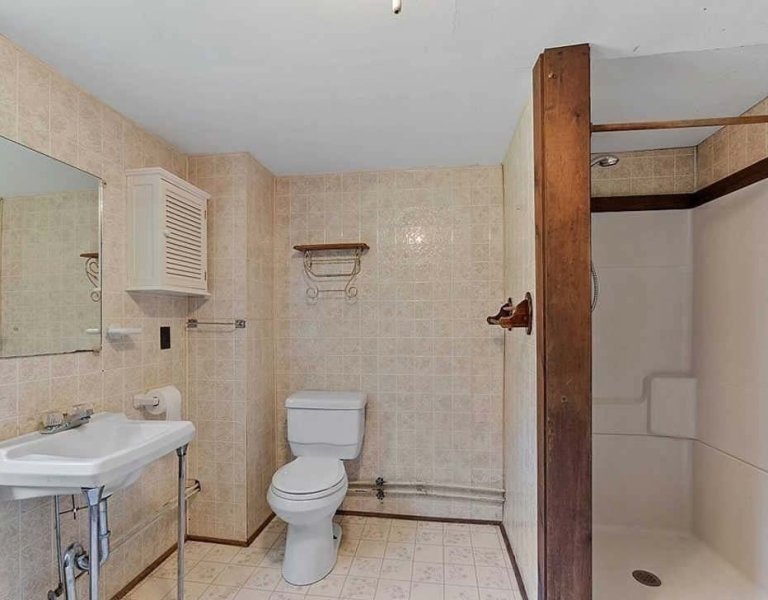
Why remodel your bathroom?
Remodeling your bathroom not only enhances the aesthetics of your home but also adds value and improves functionality. From increasing energy efficiency to creating a spa-like retreat, a bathroom remodel can transform your daily routine and elevate your living experience.
- Better functionalty
- Personalizes space
- Increase home value
- Increases resale value
- Resolves safety issues
- Adds extra space
- Fixes broken items
- Mold & mildew
Bathroom Remodeling Services
Large Bathroom Remodel
Measuring 80 square feet or more, a large bathroom remodel may include a double vanity, a guest bath, or powder room.
Medium Bathroom Remodel
Typically measuring 35-40 square feet, medium-sized bathrooms are enough for a standard vanity, toilet and shower area.
Small Bathroom Remodel
Also known as a "tiny bathroom", these extra small bathroom remodels may only include a pedestal sink or small vanity, and a toilet.
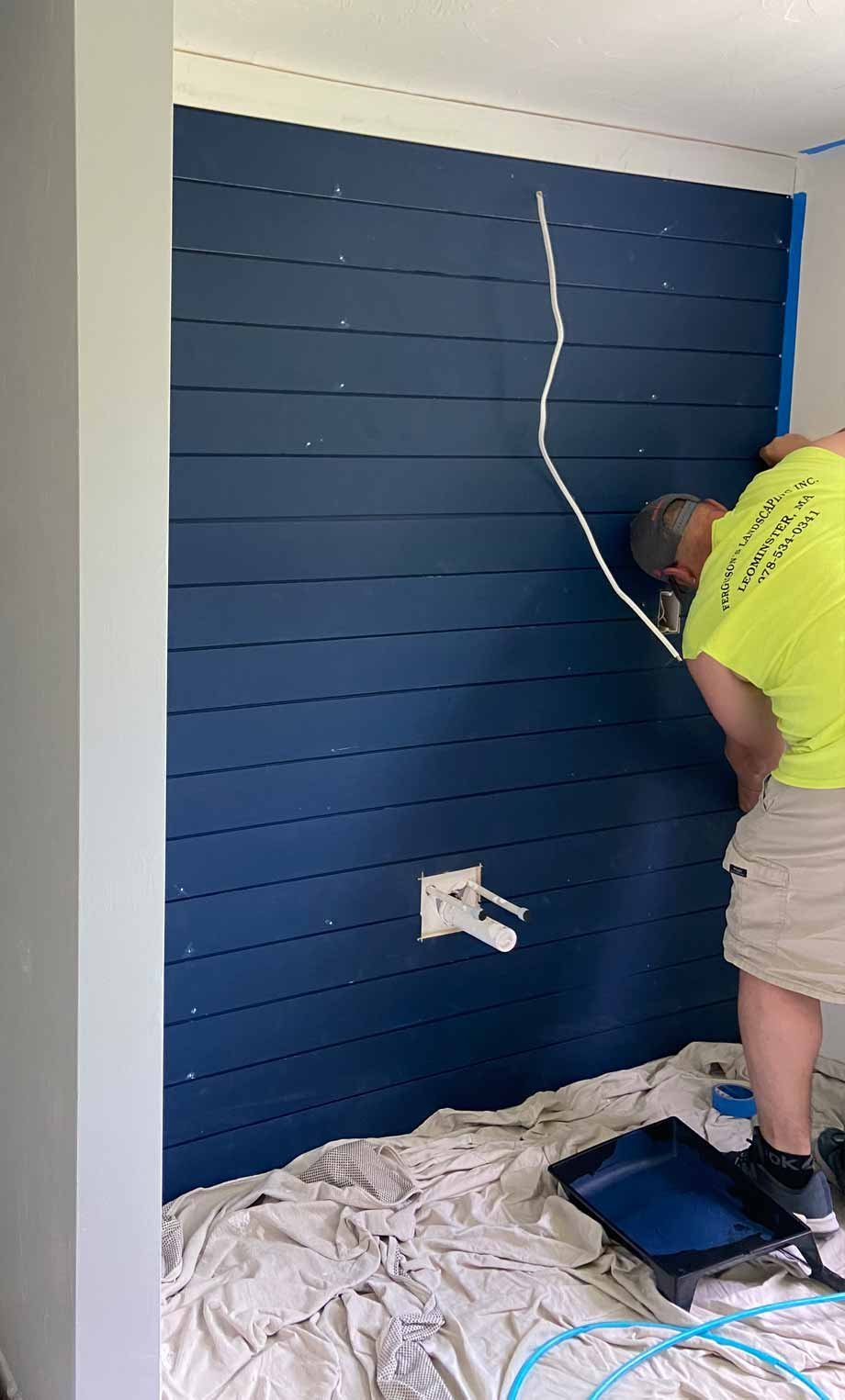
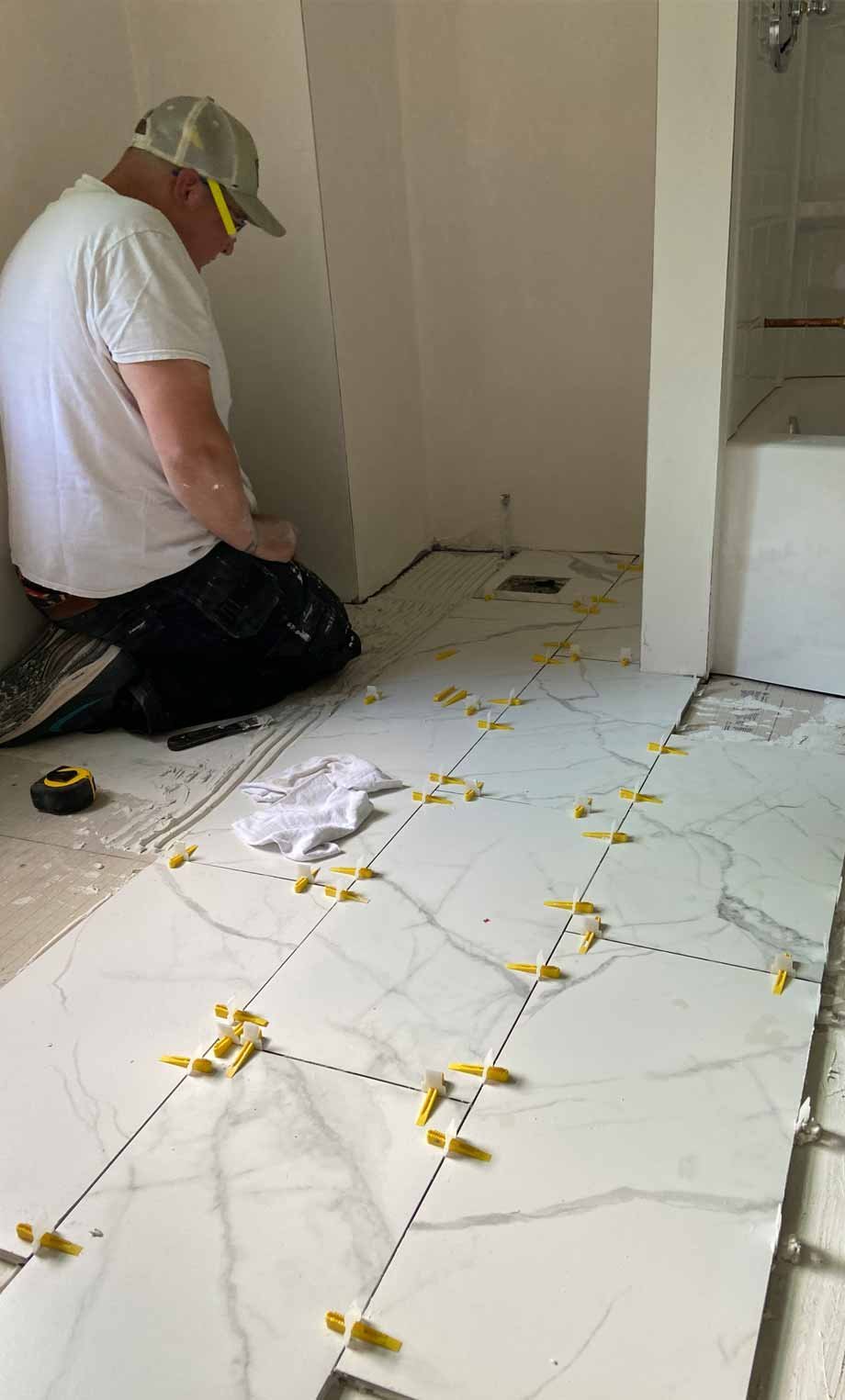
Bathroom Remodeling Potential
Beyond the aesthetics, bathroom remodeling offers an opportunity to maximize space and enhance functionality. Elevate your daily routine and add value to your home with our personalized remodeling services.
Tile Flooring
Walk-in Shower
Soaking Tub
New Appliances
Double Vanity
Extra Storage
Powder Room
Light Fixtures
Our 7-Step Bathroom Remodeling Process
Transforming your bathroom is an exciting journey. Here are our seven stages to streamline the bathroom remodeling process.
During a consultation, we’ll take measurements and discuss renovation goals. This is also a good time to share bathroom remodel ideas and your inspiration. Shortly after, you’ll receive a work estimate.
To increase functionality, your bathroom layout may need to change. Once the new floor plan is finalized, we’ll pull the work permits.
A list of supplies and materials, plus any new fixtures to elevate the interior design will be ordered.
Existing fixtures, tiles, and other elements of the bathroom will be removed.
If necessary, any plumbing, electrical, and HVAC systems will be roughed-in.
All new bathroom fixtures and materials will be installed such as the flooring, tiled walls, a sink/vanity, mirrors, lights, etc.
To conclude your bathroom remodeling project, any permitted work will be signed-off on by an inspector.
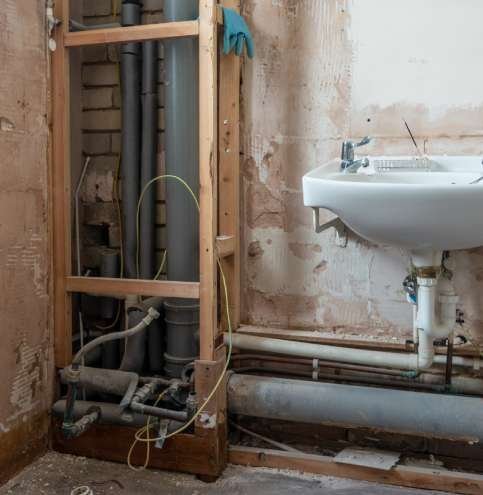
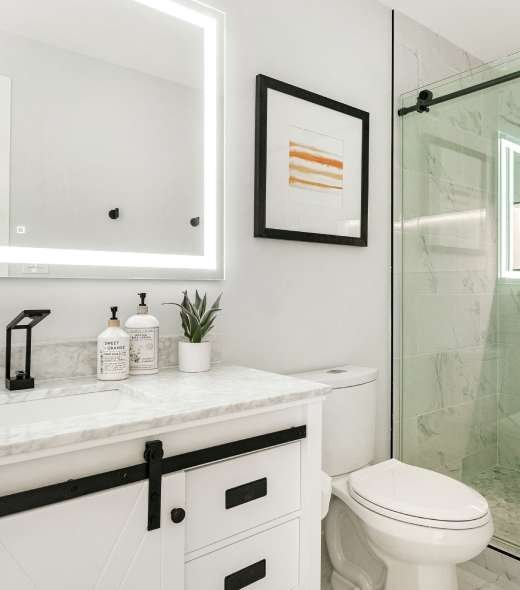
Frequently Asked Questions
Generally, remodeling a bathroom can have a positive impact on a home’s value, as bathrooms are one of the most important rooms for potential buyers and can significantly influence their decision-making process. On average, a well-executed bathroom remodel typically yields a return on investment (ROI) of around 60% to 70%.
However, it’s important to note that the ROI of a bathroom remodel can vary depending on the specific features and upgrades included in the remodel, as well as the local market conditions.
On average, a basic bathroom remodel can cost anywhere from $3,000 to $15,000, while a more comprehensive remodel with higher-end materials and light fixtures can range from $10,000 to $35,000 or more.
To determining a realistic budget, here are some question to consider before starting any bathroom remodel project:
How big is my bathroom? Light fixtures and vanity aside, many materials needed for a bathroom remodel are calculated by the square foot such as tile, blue board, or wood. The more square footage your bathroom has, the more material you’ll need.
What is the extent of the bathroom renovation? Sometimes a bathroom remodel simply means updating the bathroom design, which does not require a layout change. This could be installing a new toilet, adding new light fixtures, or replacing a pedestal sink with a vanity and vessel sink. The possibilities are endless. In cases where the bathroom layout will need to change, you should expect to may more for plumbing and electrical work.
What quality of materials do I want to use? Materials may be the most expensive part of your bathroom remodel. If it’s your forever home or a house you expect to live in for many years to come, you may be inclined to spend extra money on the materials, such as quartz vs. granite on the bathroom vanity. If the intention is to update the bathroom interior design to increase resale value, you may decide to go with a mid to lower-grade material, which can be more cost effective.
How much can I afford in labor costs? Hiring a general contractor for a bathroom remodel typically costs between 10% to 20% of the total project cost. If there are multiple people working on the project, there could be an additional labor costs.
Whether you need a permit to remodel your bathroom depends on the specific scope of work you plan to undertake and the regulations in your local area. If your bathroom remodel involves changes to the structure electrical wiring, plumbing, or other major alterations, you will likely need a permit.
Here are some common situations where you might need a permit for a bathroom remodel:
Structural Changes: If you’re altering the bathroom layout, such as moving walls, adding or removing windows or doors, or making significant changes to the floor plan, you will likely need a permit.
Plumbing Work: Installing new plumbing fixtures (double vanity), rerouting plumbing lines, or making significant changes to the plumbing system.
Electrical Work: Adding or relocating electrical outlets, installing new light fixtures, or making changes to the electrical wiring.
Ventilation: Installing or modifying ventilation systems, such as adding a bathroom vent fan.
Waterproofing and Tiling: While minor cosmetic changes like replacing the floor tile may not require a permit, if you’re waterproofing or tiling large areas. In cases of showers or tub surrounds, you may need a permit to ensure compliance with building codes.
Accessibility Modifications: If you’re making modifications to your bathroom to improve accessibility for individuals with disabilities, you may need permits to ensure compliance with accessibility standards.
It’s essential to check with your local building department or permitting office to determine the specific permit requirements for your bathroom remodel. Failing to obtain the necessary permits can result in fines, delays, and potential complications when selling your home in the future. Additionally, permits ensure that your remodel meets safety and building code requirements, helping to protect your investment and the well-being of occupants.
The bathroom remodeling process can take anywhere from a two weeks to several months to complete depending on the extent of the renovations and the bathroom’s square footage. Additionally, unforeseen complications, delays in obtaining materials, and scheduling conflicts with contractors can also have a huge impact the timeline of the project.
To speed up your home improvement project, it’s important for both homeowner and general contractor to have a clean understanding of the materials needed and how things will be changes. We highly recommend researching bathroom remodel ideas in advance and then pre-selecting the materials and fixtures you’d like to use. You may want to ask yourself:
Do I prefer a bathroom vanity or a pedestal sink?
Do I want to add more storage space (closet) or will medicine cabinets be enough?
Will my bathroom design include a new freestanding tub or a single shower stall?
Do I have a bathroom floor tile in mind, or do I want laminate?
Do I want a new light fixture?
Do I need a towel racks?
Is it time to replace my shower heads?
Have I decided on a color scheme? Do I want to go with a vibrant color or a neutral color pallet?
Whether you need a general contractor for a bathroom remodel depends on the complexity of the project, your level of expertise in construction and remodeling, and your availability to oversee and manage the various aspects of the renovation.
If you’re unsure, consider consulting with Caron Home Remodeling to discuss your project goals and the best approach for your needs.
Scope of Work: If your bathroom remodel involves simple cosmetic updates such as painting, replacing fixtures, or updating hardware, you may be able to handle the project yourself or hire individual subcontractors for specific tasks like plumbing or electrical work.
Complexity of the Project: For more extensive remodels that involve structural changes, plumbing or electrical rerouting, or major renovations requiring multiple trades, hiring a general contractor can ensure that the project is properly planned, coordinated, and executed to meet building codes and safety standards.
Time and Expertise: Managing a bathroom remodel can be time-consuming and requires knowledge of construction techniques, materials, and local building codes. If you have limited time or lack experience in remodeling, hiring a general contractor can save you time and ensure that the project is completed efficiently and to a high standard of quality.
Coordination of Trades: A general contractor typically oversees and coordinates all aspects of the remodel, including hiring and scheduling subcontractors, obtaining permits, ordering materials, and managing the timeline and budget. This can streamline the process and minimize potential delays and complications.
Peace of Mind: Hiring a reputable general contractor can provide peace of mind knowing that experienced professionals are handling the project, addressing any issues that arise, and ensuring that the work is completed to your satisfaction.
The terms “bathroom remodel” and “bathroom renovation” are often used interchangeably, but there is a subtle distinction between the two. A bathroom remodel typically involves making cosmetic changes or upgrades to improve the appearance, functionality, and aesthetics of the bathroom without altering its fundamental layout or structure. This may include replacing fixtures, updating finishes, and refreshing the overall look of the space.
On the other hand, a bathroom renovation typically involves more extensive changes, such as altering the layout, moving walls, or making structural modifications to the bathroom. Renovations may also include upgrading plumbing, electrical, and HVAC systems, as well as installing new fixtures and finishes.



